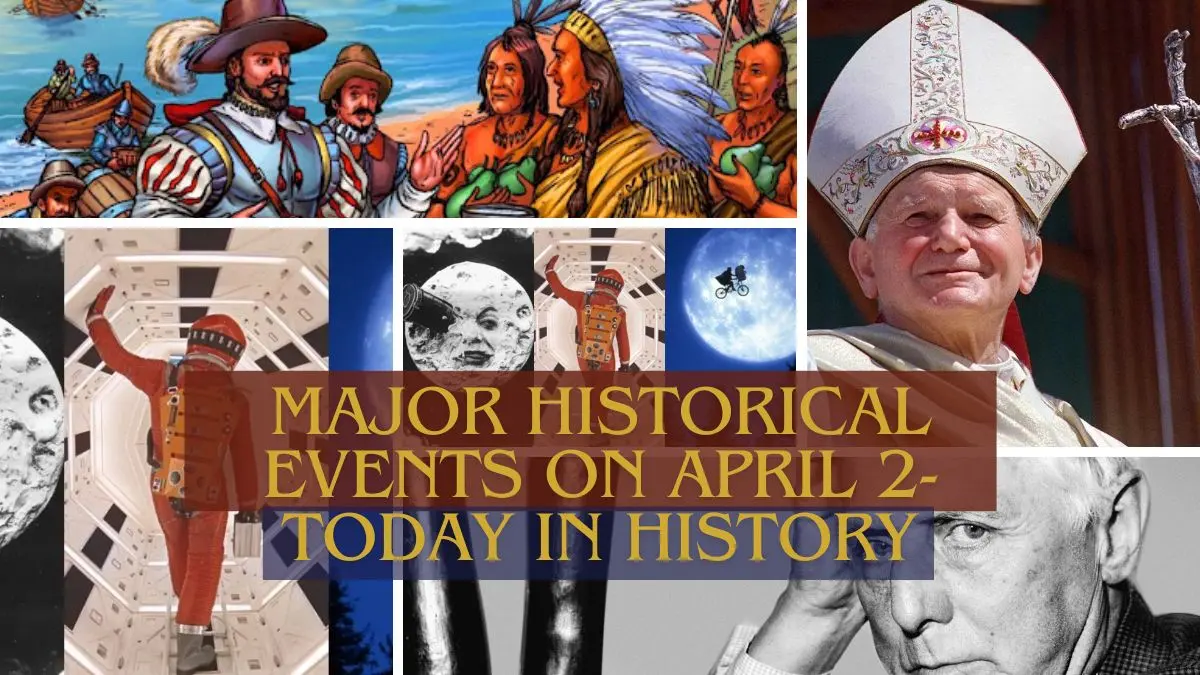This article delves into the major historical events on April 2, providing insights into their impact and legacy. It invites you on an immersive journey into the past. From battles that changed the course of wars to inventions that revolutionized our lives, April 2nd has it all.
Major Historical Events on April 2- Today in History
Charlemagne: A Medieval Titan – 747 AD
Charlemagne, a figure of immense influence in medieval Europe, ruled as king and emperor, his reign laying the groundwork for what would become known as the Holy Roman Empire.
The Dawn of Florida’s European Chapter – 1513 AD
The shores of Florida felt the weight of European ambition when Juan Ponce de León, a Spanish explorer, made landfall, marking a pivotal moment in the New World’s history.

A Quaker Haven Established – 1681 AD
The vision of a Quaker sanctuary in North America took formal shape under King Charles II of England. He officially endorsed the charter he had bestowed upon William Penn in March, giving birth to Pennsylvania.
The Birth of Agricultural Literature in America – 1819 AD
In the year 1819, the landscape of agricultural communication was forever changed with the launch of the “American Farmer” journal. As the first successful publication dedicated to the nuances of farming, husbandry, and rural life, it marked a significant milestone in the dissemination of agricultural knowledge and practices in the United States.
A Strategic Withdrawal in the Civil War – 1865 AD
As Union forces closed in, the Confederate defenders of Richmond, Virginia, had no choice but to abandon the capital, a decisive moment in the American Civil War’s outcome.
Max Ernst: A Pioneer of Surrealism – 1891 AD
Born was Max Ernst, a German artist whose work in sculpture and painting defied rational thought and became foundational to the surrealism movement.

Titanic Undergoes Trials – 1912 AD
In 1912, the Titanic, a marvel of maritime engineering, embarked on its sea trials powered by its own formidable engines. This pivotal moment marked the final preparations of what was to be the largest and most luxurious ocean liner of its time.
Alec Guinness: A Theatrical Icon – 1914 AD
The world welcomed British actor Alec Guinness, whose unparalleled versatility in both stage and film roles would leave an indelible mark on the performing arts.
A Nation on the Brink of War – 1917 AD
U.S. President Woodrow Wilson took the solemn step of requesting a war declaration against Germany from Congress, steering the United States towards involvement in World War I.
A New Era in Science Fiction Cinema – 1968 AD
Stanley Kubrick’s “2001: A Space Odyssey” premiered, redefining the science fiction genre with its innovative storytelling and visual effects, in Washington, D.C.

‘Dallas’: A Television Phenomenon – 1978 AD
The initial airing of “Dallas” as a miniseries on American TV set the stage for its transformation into a cultural landmark, reshaping prime-time drama.
The Falkland Islands Conflict Ignites – 1982 AD
Argentine forces’ occupation of the Falkland Islands sparked a conflict with Britain, a confrontation that would draw global attention to the remote archipelago.
The Downfall of a Mob Kingpin – 1992 AD
John Gotti, an emblematic figure of American organized crime, faced justice with a conviction on multiple criminal charges, signaling the end of his reign of terror.
Pope John Paul II: A Spiritual Journey Concludes – 2005 AD
The Roman Catholic Church mourned the loss of Pope John Paul II, a pontiff whose origins outside Italy broke centuries of tradition and who left a lasting legacy on the papacy.

Manoel de Oliveira: A Cinematic Virtuoso – 2015 AD
The film world bid farewell to Portuguese director Manoel de Oliveira, a centenarian whose works delved deeply into the human condition, often through the prism of literature and drama.
Also Read: Major Historical Events on April 1- Today in History









